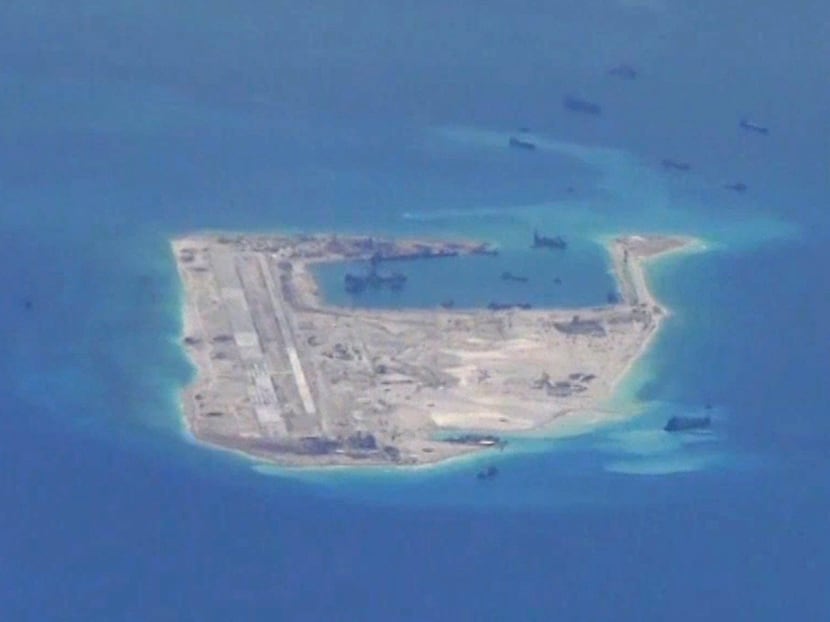Japan, Vietnam concerned over land reclamation in S China Sea
TOKYO — Japanese Prime Minister Shinzo Abe said today (July 4) he has shared deep concern with Vietnamese Prime Minister Nguyen Tan Dung over land reclamation work in the South China Sea, taking aim at China’s attempts to change the status quo.

Chinese dredging vessels are purportedly seen in the waters around Fiery Cross Reef in the disputed Spratly Islands in the South China Sea in this still file image from video taken by a P-8A Poseidon surveillance aircraft provided by the United States Navy May 21, 2015. Photo: Reuters
TOKYO — Japanese Prime Minister Shinzo Abe said today (July 4) he has shared deep concern with Vietnamese Prime Minister Nguyen Tan Dung over land reclamation work in the South China Sea, taking aim at China’s attempts to change the status quo.
Mr Abe said at a joint press conference with Mr Dung after their talks that they “shared serious concerns over unilateral attempts to change the status quo,” without singling out China but apparently bearing in mind China’s growing maritime assertiveness.
“Our countries will further cooperate in building order at sea, land and air,” he said as they met after a summit of Japan and five Southeast Asian countries along the Mekong River, including Vietnam as well as Cambodia, Laos, Myanmar and Thailand.
Tensions in the South China Sea have been exacerbated in recent months due to the massive and fast-faced reclamation work which includes military installations. Other Asian countries and the United States have voiced their concerns over Beijing’s moves.
Mr Dung said at the same news conference that he and Abe agreed on the importance of upholding the freedom of navigation.
China claims sovereignty over most of the South China Sea, which is a vital shipping lane and believed to have rich fishing grounds. Rival claimants in the dispute are Vietnam, the Philippines, Malaysia, Brunei and Taiwan, with Vietnam being vocal in opposing China’s push for overlapping territorial claims.
Dung also asked Japan for new patrol boats to protect his country’s seas, and Abe responded by saying Japan will discuss the matter to make it happen at an early date, Japan’s Foreign Ministry said.
Mr Dung said he agreed as well with Mr Abe to boost measures to counter terrorism.
Beyond their cooperation on maritime security and other global issues, Mr Abe and Mr Dung agreed to work together to pursue Vietnam’s infrastructure development.
On the occasion of their talks, Japan and Vietnam signed several agreements including providing yen loans totaling $538.19 million (S$5.9 million) for projects aimed at improving the Southeast Asian country’s power and water systems, and grant aid of around $29.8 million yen.
Pushing for better infrastructure in Vietnam, which together with Cambodia, Laos and Myanmar is considered one of the less-developed members of ASEAN, is in line with Mr Abe’s investment initiative announced in May to provide $110 billion yen to promote “quality infrastructure” in Asia over the next five years.
Japanese government data show that as of 2013, per capita gross domestic product was $2,073 yen in Vietnam, $1,628 yen in Laos, $1,103 yen in Myanmar and $1,018 yen in Cambodia, compared with $5,390 yen in Thailand, one of the leading countries of the Association of Southeast Asian Nations.
The average for ASEAN countries - also comprising Brunei, Indonesia, Malaysia, the Philippines and Singapore - is about $3,839 yen. KYODO NEWS AGENCY






